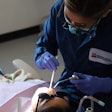
Dental therapists will eventually practice in every U.S. state, predicted the manager of dental campaigns for the Pew Charitable Trusts in an August 18 article from the Associated Press (AP).
"It's no longer a question of if dental therapists will be authorized in every state," said Kristen Mizzi Angelone, manager of the Pew dental campaign. "At this point, it's really only a matter of when."
Twelve U.S. states allow for dental therapists to practice in some form, according to Pew. Arizona, Nevada, Connecticut, Michigan, and New Mexico have recently passed laws authorizing dental therapists. Idaho and Montana also have passed laws allowing dental therapists on reservations, according to the AP.
However, training these practitioners is a stumbling block, as only two states (Alaska and Minnesota) have educational programs in place, the AP noted. Minnesota's program is the only one that offers a master's degree, which is often a requirement to practice, it added.
A proposed dental therapy program may launch in fall 2021 at the Vermont Technical College in Randolph Center, according to the AP. This program has received a $400,000 grant from the U.S. Department of Health and Human Services and may offer a distance-learning option for potential practitioners in other states.
A dental therapist law in Maine was passed in 2014, but no therapists are practicing in that state, according to a January article from the American Dental Hygienists' Association (ADHA). Reimbursement issues are among the problems that have limited the growth of dental therapists in that state, the ADHA noted.
Organized dentistry is often opposed to laws that enable dental therapists to practice, according to the AP article. The Maine Dental Association paid nearly $12,000 to fight the 2014 law in Maine.
Dental groups in Nevada and Michigan previously argued that lawmakers should increase Medicaid reimbursement to encourage dentists to accept low-income patients, the AP stated.



















